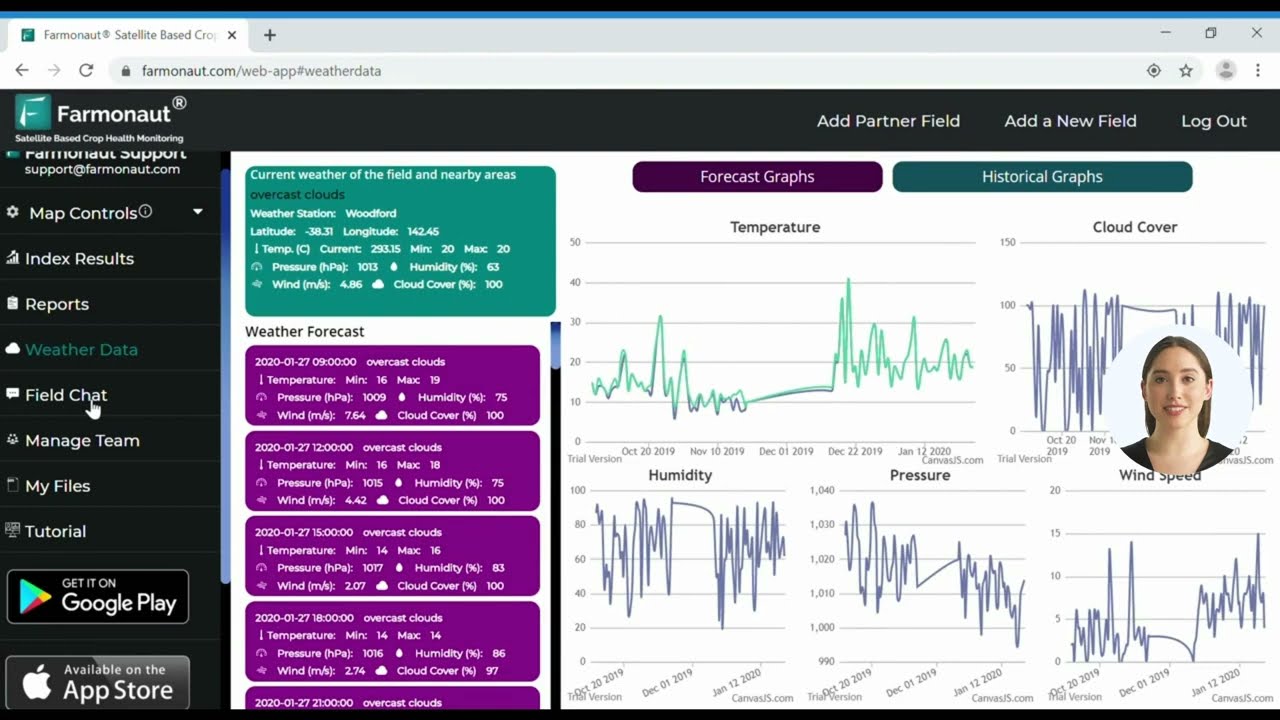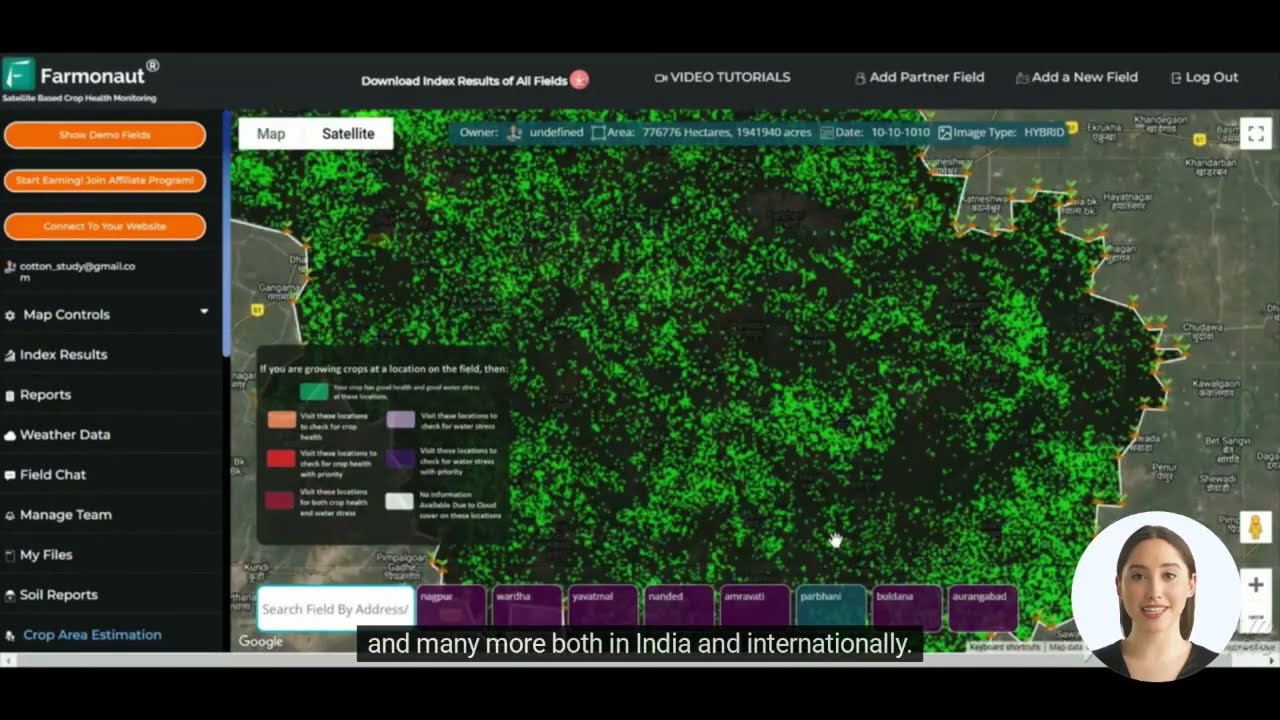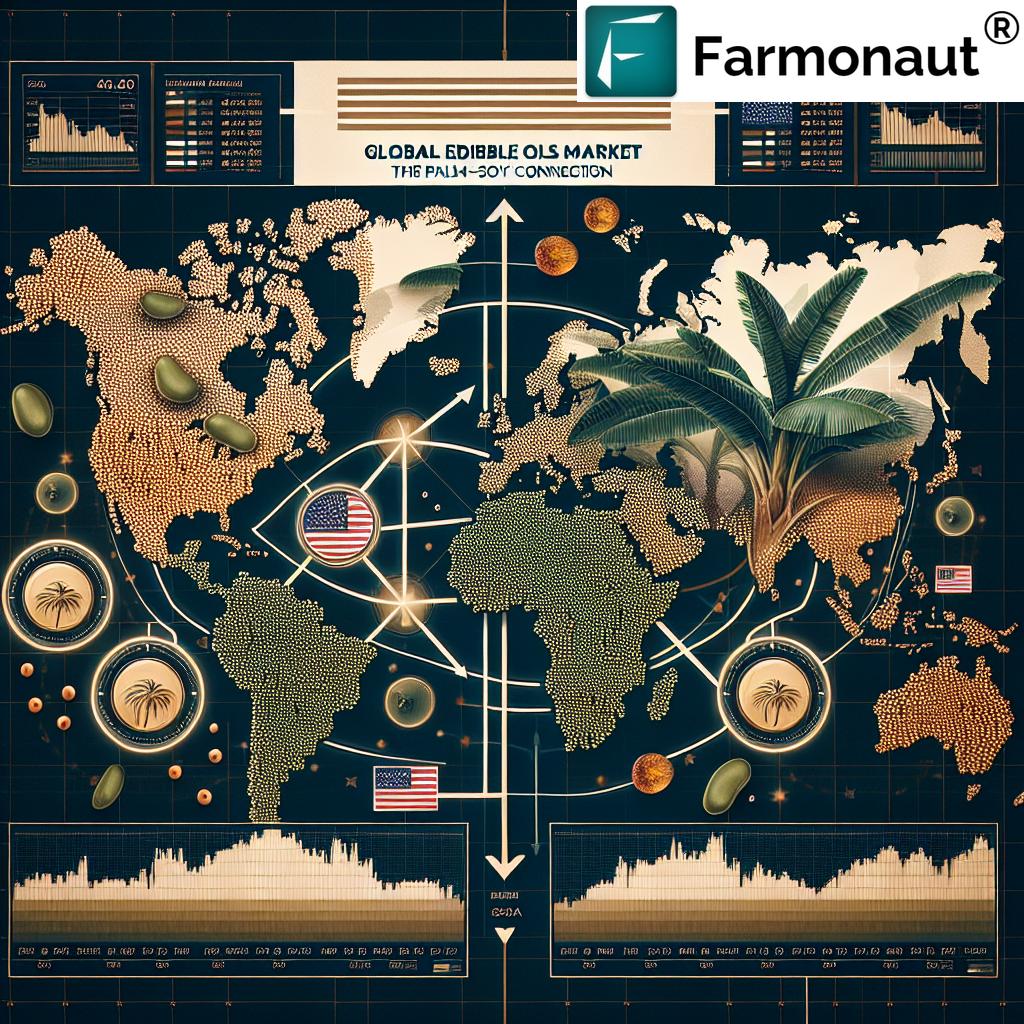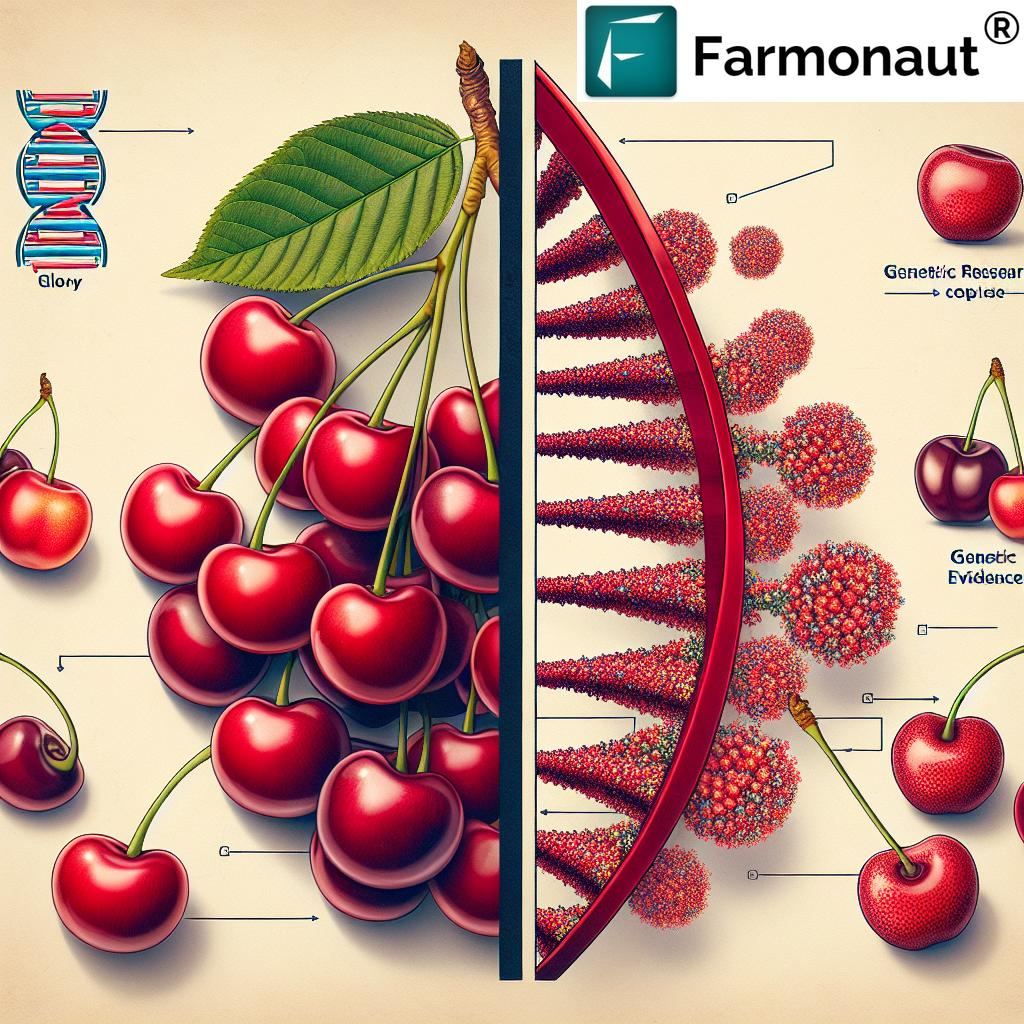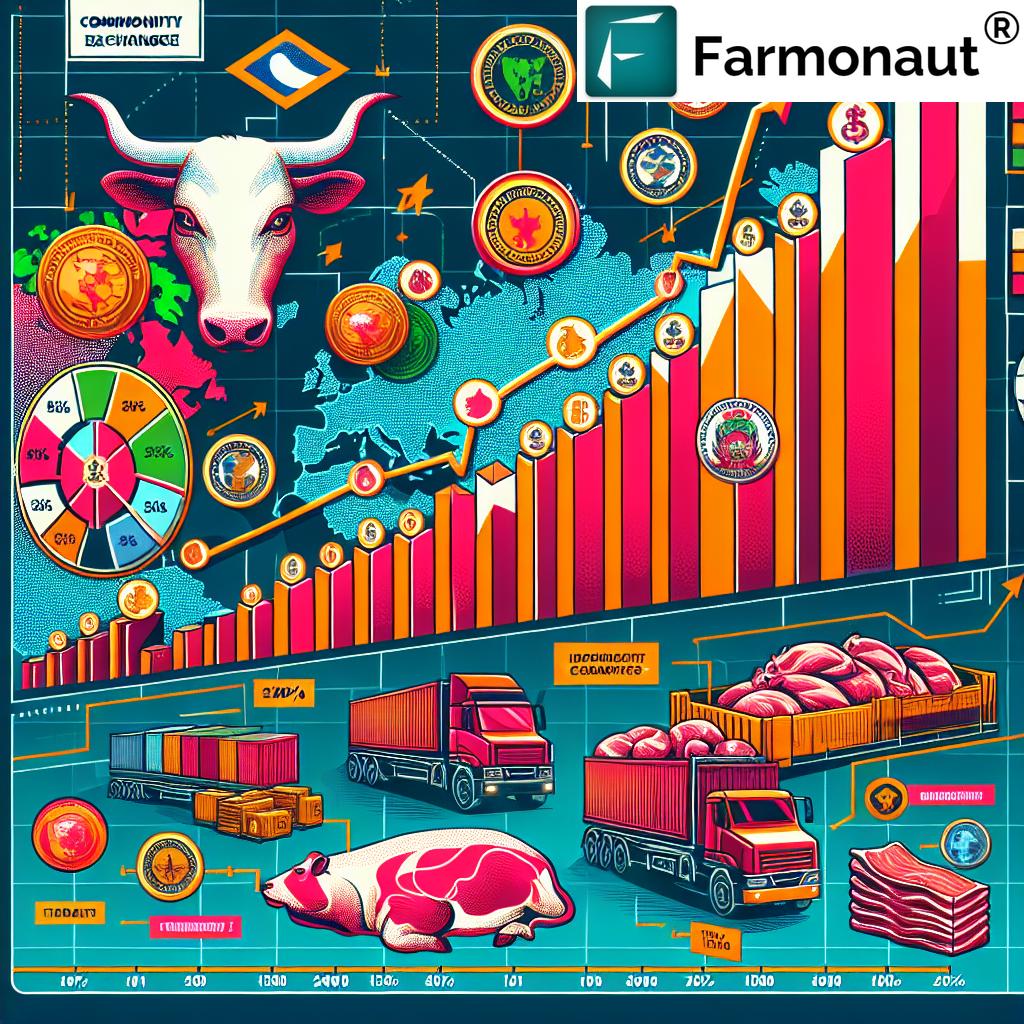Global Commodity Futures: Cocoa, Coffee, and Sugar Market Trends Ahead of Christmas 2025
“Cocoa futures declined in both New York and London markets despite strong crop arrivals in top-producing regions.”
As we approach the festive season of Christmas 2025, the global commodity futures market for cocoa, coffee, and sugar is experiencing significant fluctuations. At Farmonaut, we’re closely monitoring these trends and their potential impact on the agricultural sector. Our advanced satellite-based farm management solutions provide valuable insights into crop health and yield forecasting, which are crucial in understanding and navigating these market dynamics.

Cocoa Market Trends: A Surprising Downturn
Despite strong crop arrivals in top-producing regions, cocoa futures have experienced a surprising decline in both New York and London markets. This unexpected trend highlights the complex interplay of factors influencing commodity prices.
- New York Cocoa Futures: Settled at $11,446 per metric ton, marking a 2.55% decline
- Previous Week’s Record High: $12,931 per metric ton
- London Cocoa Futures: Closed 2.5% lower at 9,134 pounds per ton
These declines come as a surprise, considering the strong cocoa arrivals in the Ivory Coast, the world’s leading cocoa-producing nation. The arrivals are surpassing last year’s deliveries, which typically would support higher prices. However, market dynamics are proving to be more complex.
Weather Concerns in Cocoa-Producing Regions
Despite the current strong arrivals, there are growing concerns among farmers about the impact of the Harmattan wind. This dry, dusty wind from the Sahara can have significant effects on cocoa production:
- Dries out the soil, potentially affecting cocoa pod development
- May lead to smaller bean sizes and reduced overall yield
- Could impact the quality of cocoa beans if severe
At Farmonaut, our satellite-based crop monitoring technology can help cocoa farmers track these weather patterns and their potential impact on crop health. By utilizing our web app, farmers can access real-time data on soil moisture levels and vegetation health, enabling them to make informed decisions about irrigation and crop management.
Coffee Market Outlook: A Tale of Two Varieties
“Coffee market outlook remains pessimistic, with Arabica prices falling while Robusta prices slightly increased.”
The coffee futures market is showing divergent trends between its two main varieties: Arabica and Robusta. This split in market behavior reflects the unique challenges and conditions affecting each type of coffee.
Arabica Coffee: Facing Downward Pressure
- Arabica Futures: Fell by 0.7% to $3.2490 per pound
- Key Factor: Record-high prices spurring increased sales from Brazilian producers
- Market Activity: Slowing down due to the approaching holiday season
The high prices have encouraged Brazilian producers to increase their sales, which is putting downward pressure on Arabica futures. However, the outlook for next year’s Brazilian crop remains pessimistic, largely due to the impact of this year’s drought.
Robusta Coffee: Slight Increase Amid Concerns
- Robusta Futures: Closed 0.7% higher at $5,041 per ton
- Market Dynamics: Showing resilience compared to Arabica
The slight increase in Robusta prices suggests a more balanced supply-demand situation for this variety. However, the overall coffee market remains cautious due to potential supply tightening into 2025.
Impact of Drought on Coffee Production
The drought conditions experienced this year are casting a long shadow over coffee production forecasts. At Farmonaut, we understand the critical role that weather plays in crop yields. Our advanced crop yield forecasting tools can help coffee growers:
- Monitor soil moisture levels using satellite data
- Track vegetation health indices to assess crop stress
- Receive early warnings about potential drought impacts
By leveraging these tools, available through our Android app and iOS app, coffee producers can make timely decisions to mitigate the effects of adverse weather conditions.

Sugar Market: Sweet Rebound from Recent Lows
The sugar market is showing signs of recovery, with prices rebounding from recent lows. This uptick in sugar prices is attributed to various factors affecting both supply and demand.
Raw Sugar Price Movements
- Raw Sugar Prices: Rose by 1% to 19.73 cents per pound
- Recent Performance: Rebounding from a three-month low
- March White Sugar Futures: Closed up 1.2% at $518.40 per ton
Factors Influencing Sugar Prices
Several key factors are contributing to the current sugar market trends:
- Speculator Activity: Reduction of short positions ahead of the holiday season
- Production Slowdowns: Ongoing issues in Brazil’s Centre-South region
- Seasonal Variations: Impact of weather patterns on sugar cane cultivation
- Global Demand: Fluctuations in consumption patterns and economic factors
At Farmonaut, we recognize the importance of accurate crop monitoring for sugar cane producers. Our satellite-based technologies can assist in:
- Assessing sugar cane health across large plantations
- Identifying areas of stress or potential disease outbreaks
- Optimizing harvest timing based on crop maturity data
These capabilities, accessible through our API, can significantly enhance sugar cane production efficiency and help producers navigate market fluctuations more effectively.
Agricultural Market Analysis: Underlying Supply Concerns
As we delve deeper into the agricultural commodity prices, it’s clear that underlying supply concerns are a significant factor, particularly in the cocoa and coffee markets. These concerns have the potential to tighten supplies into 2025, making crop yield forecasting more crucial than ever.
Cocoa Supply Outlook
Despite current strong arrivals, the cocoa market faces potential challenges:
- Weather Risks: The Harmattan wind’s impact on West African cocoa regions
- Production Uncertainty: Potential for reduced yields in coming seasons
- Global Demand: Increasing consumption in emerging markets
Farmonaut’s satellite-based crop monitoring can play a vital role in assessing these risks. Our technology allows for:
- Real-time monitoring of cocoa plantations
- Early detection of stress factors affecting crop health
- Precise estimation of cocoa pod development and potential yields
Coffee Supply Chain Challenges
The global coffee supply chain is facing significant hurdles:
- Drought Impact: Lingering effects on Brazilian coffee production
- Climate Variability: Increasing uncertainty in traditional coffee-growing regions
- Shifting Production Patterns: Potential changes in global coffee cultivation areas
Our crop yield forecasting tools at Farmonaut can assist coffee producers in:
- Assessing the impact of drought on coffee plantations
- Predicting potential yields based on current crop health
- Identifying optimal areas for coffee cultivation under changing climate conditions
The Role of Weather in Agricultural Commodity Markets
The impact of weather on agriculture cannot be overstated, especially in the context of commodity futures trading. Extreme weather events, seasonal variations, and long-term climate trends all play crucial roles in shaping market dynamics.
Weather Impact on Cocoa Production
In cocoa-producing regions, weather conditions are critical:
- Rainfall Patterns: Adequate rainfall is essential for cocoa pod development
- Temperature Fluctuations: Can affect flowering and fruit set
- Harmattan Winds: Dry conditions can stress cocoa trees and reduce yields
Farmonaut’s satellite-based monitoring provides valuable insights into these weather impacts, helping cocoa farmers make informed decisions about irrigation, shade management, and harvest timing.
Climate Variability and Coffee Cultivation
Coffee production is particularly sensitive to climate changes:
- Temperature Changes: Affect coffee plant growth and bean quality
- Rainfall Distribution: Critical for flowering and cherry development
- Extreme Weather Events: Can damage crops and reduce yields
Our advanced crop monitoring tools at Farmonaut can help coffee growers:
- Track temperature and rainfall patterns in coffee-growing regions
- Assess the impact of weather variations on crop health
- Plan for potential shifts in suitable coffee-growing areas
Weather Considerations in Sugar Production
Sugar cane cultivation is also heavily influenced by weather conditions:
- Drought Stress: Can significantly reduce sugar content and yields
- Excessive Rainfall: May lead to waterlogging and reduced sugar accumulation
- Temperature Extremes: Affect growth rates and sugar concentration
Farmonaut’s satellite imagery and AI-driven analytics can assist sugar producers in:
- Monitoring soil moisture levels across large plantations
- Detecting early signs of crop stress due to weather conditions
- Optimizing irrigation schedules based on real-time data
Sustainable Farming Practices in Commodity Production
As market dynamics evolve, the importance of sustainable cocoa farming and other commodity crops becomes increasingly evident. Sustainable practices not only ensure long-term viability but can also impact market prices and consumer preferences.
Sustainable Cocoa Farming
Implementing sustainable practices in cocoa farming is crucial for both environmental preservation and market stability:
- Agroforestry Systems: Integrating cocoa with other tree species for improved biodiversity
- Water Management: Efficient irrigation techniques to conserve water resources
- Soil Conservation: Practices to maintain soil health and prevent erosion
Farmonaut’s technology supports sustainable cocoa farming by:
- Providing data on optimal planting densities and intercropping patterns
- Monitoring soil moisture levels to prevent over-irrigation
- Tracking vegetation health to ensure sustainable land use
Sustainable Coffee Production
The coffee industry is increasingly focusing on sustainability:
- Shade-Grown Coffee: Promoting biodiversity and reducing the need for chemical inputs
- Water Conservation: Implementing efficient processing methods to reduce water usage
- Fair Trade Practices: Ensuring equitable compensation for coffee farmers
Our satellite-based solutions at Farmonaut assist in sustainable coffee production by:
- Assessing the effectiveness of shade-grown coffee systems
- Monitoring water usage and identifying areas for conservation
- Providing data to support fair trade certifications
Sustainable Sugar Cane Cultivation
Sustainability in sugar production is becoming increasingly important:
- Precision Agriculture: Optimizing input use to reduce environmental impact
- Crop Rotation: Implementing practices to maintain soil health
- Waste Reduction: Utilizing by-products for energy production
Farmonaut’s technology supports sustainable sugar cane farming through:
- Precise mapping of fields for optimal input application
- Monitoring crop health to inform rotation decisions
- Assessing biomass potential for energy production
Commodity Price Comparison Table
| Commodity | Current Price (Estimated) | Price Change | Supply Outlook | Key Factors Influencing Price |
|---|---|---|---|---|
| Cocoa | $11,446 per metric ton (NY) | -2.55% | Tight | Strong arrivals, Harmattan concerns |
| Coffee (Arabica) | $3.2490 per pound | -0.7% | Tight | Drought impact, increased sales |
| Coffee (Robusta) | $5,041 per ton | +0.7% | Stable | Balanced supply-demand |
| Sugar (Raw) | 19.73 cents per pound | +1% | Stable to Abundant | Production slowdowns, speculator activity |
The Future of Commodity Markets: Technology and Sustainability
As we look towards the future of commodity markets, particularly in cocoa, coffee, and sugar, two key themes emerge: the increasing role of technology and the growing importance of sustainability.
Technological Advancements in Agriculture
The integration of advanced technologies is revolutionizing commodity production:
- Satellite Imagery: Providing real-time crop monitoring and yield forecasting
- AI and Machine Learning: Enhancing decision-making in farm management
- Blockchain: Improving traceability and transparency in supply chains
At Farmonaut, we’re at the forefront of this technological revolution. Our platform integrates these advanced technologies to provide farmers and commodity traders with actionable insights. For instance, our API Developer Docs offer detailed information on how to leverage our satellite and weather data for various agricultural applications.
Sustainability as a Market Driver
Sustainability is becoming a significant factor in commodity markets:
- Consumer Demand: Growing preference for sustainably produced commodities
- Regulatory Environment: Increasing focus on environmental and social governance
- Long-term Viability: Sustainable practices ensuring continued production
Farmonaut’s tools support sustainable farming practices by:
- Optimizing resource use through precise monitoring
- Supporting certification processes with data-driven insights
- Enabling farmers to adapt to changing climate conditions
Conclusion: Navigating the Complex Commodity Landscape
As we approach Christmas 2025, the global commodity futures market for cocoa, coffee, and sugar presents a complex landscape of challenges and opportunities. The interplay of weather impacts, production uncertainties, and evolving market dynamics underscores the need for advanced monitoring and forecasting tools.
At Farmonaut, we’re committed to providing cutting-edge solutions that empower farmers, traders, and industry professionals to navigate these complexities. Our satellite-based farm management solutions, AI-driven insights, and comprehensive data analytics are designed to support informed decision-making in this ever-changing agricultural landscape.
As we move forward, the integration of sustainable practices and technological advancements will play a crucial role in shaping the future of commodity markets. By staying informed and leveraging innovative tools, stakeholders in the cocoa, coffee, and sugar industries can better position themselves to thrive in this dynamic environment.
FAQs
- How do weather patterns affect cocoa production?
Weather patterns, particularly rainfall and temperature, significantly impact cocoa production. Adequate rainfall is crucial for pod development, while extreme temperatures can stress cocoa trees and reduce yields. The Harmattan winds in West Africa can dry out soils and affect crop quality. - What factors are contributing to the pessimistic outlook for coffee production?
The pessimistic outlook for coffee production is primarily due to drought conditions in major producing regions, particularly Brazil. Climate variability, including unpredictable rainfall patterns and temperature fluctuations, also contributes to uncertainty in coffee yields. - How is sustainability impacting commodity markets?
Sustainability is increasingly influencing commodity markets through growing consumer demand for sustainably produced goods, stricter regulatory environments, and the long-term viability of production practices. This trend is driving changes in farming methods and supply chain management. - What role does technology play in modern commodity production?
Technology plays a crucial role in modern commodity production through satellite-based crop monitoring, AI-driven analytics for farm management, and blockchain for supply chain transparency. These technologies enhance decision-making, improve efficiency, and support sustainable practices. - How can farmers use satellite data to improve crop yields?
Farmers can use satellite data to monitor crop health, track soil moisture levels, detect early signs of stress or disease, and optimize resource use. This data enables more precise farming practices, leading to improved yields and reduced environmental impact.
For more information on how Farmonaut can support your agricultural operations or commodity trading strategies, visit our website or explore our mobile apps:


